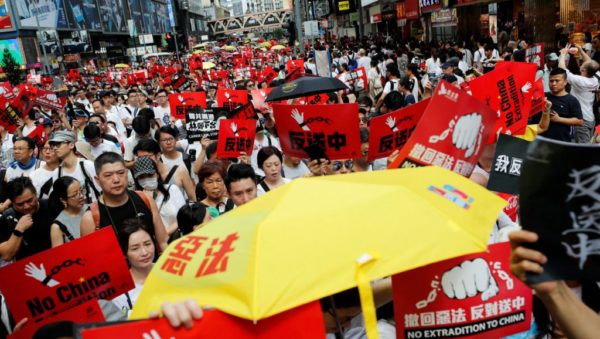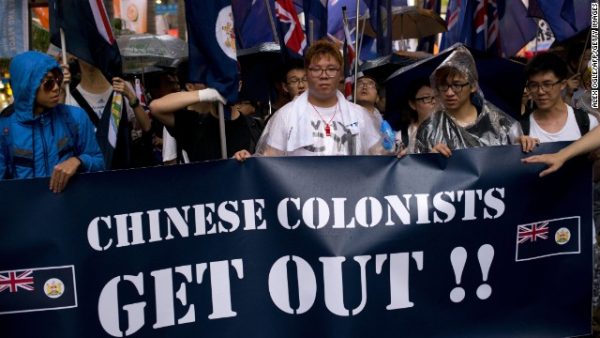
Hong Kong’s leader Carrie Lam said on Saturday that the government will indefinitely suspend a proposed law on extradition to mainland China that had sparked widespread anger and protests.
Lam told media Saturday she took the move in response to widespread public unhappiness over the measure, which would enable authorities to send some suspects to stand trial in mainland courts.

In one of the most significant climbdowns by the government since 1997 (when control of Hong Kong was transferred from the United Kingdom to China), Lam said the city’s legislature would stop all work on the bill. The next steps would be decided after consultations with various parties, she said
Political support for the swift passage of the extradition bill had begun to crumble on Friday with several pro-Beijing politicians and a senior adviser to Lam saying discussion of the bill should be shelved for the time being.
China’s foreign ministry spokesman Geng Shuang expressed support for Lam on Saturday after she halted passage of the bill, which was backed by Beijing. The Chinese government “expresses support, respect and understanding” for Lam’s decision, he said.
The extradition measure, which would have applied to Hong Kong residents and foreign and Chinese nationals living or travelling in the territory, had many concerned it would threaten the rule of law that underpins Hong Kong’s independence and international financial status.
Around a million people, according to protest organisers, marched through Hong Kong last Sunday to oppose the bill. It was the biggest political demonstration since the territory’s return to Chinese rule in 1997. Protests through the week were met with tear gas and rubber bullets from police, plunging the city into turmoil and piling heavy pressure on Lam
Organisers said Saturday that another protest planned for Sunday will go ahead. In addition to opposing the bill they will also be calling for accountability of the police for the way protests have been handled.
Backing down from efforts to drive the bill through the legislature by July would have been unthinkable last week when the law’s passage seemed inevitable as Lam remained defiant.
‘Total withdrawal of the bill unlikely’
But Michael Tien, a member of Hong Kong’s legislature and a deputy to China’s national parliament, said a total withdrawal of the bill was unlikely.
“The amendment is supported by the central government, so I think a withdrawal would send a political message that the central government is wrong. This would not happen under ‘One country, two systems’,” he told Reuters, referring to the model under which Hong Kong enjoys semi-autonomy from China, including freedom of assembly, a free press and an independent judiciary.
Tien, a member of the pro-Beijing camp, said he supported a suspension of the bill without a timetable.
Lam has said the extradition law is necessary to prevent criminals using Hong Kong as a place to hide and that human rights will be protected by its courts, which will rule on extraditions on a case-by-case basis.
Critics, including leading lawyers and rights groups, note that China’s justice system is controlled by the Communist Party and marked by torture and forced confessions, arbitrary detention and poor access to lawyers.
Many accuse China of extensive meddling, including obstruction of democratic reforms, interference with elections and of being behind the disappearance of five Hong Kong-based booksellers since 2015 who specialised in works critical of Chinese leaders.
Beijing has denied that it has overreached in Hong Kong.
The extradition bill has spooked some of Hong Kong’s tycoons into starting to move their personal wealth off-shore, according to financial advisers, bankers and lawyers.
(FRANCE 24 with REUTERS)

Leave a Reply
You must be logged in to post a comment.